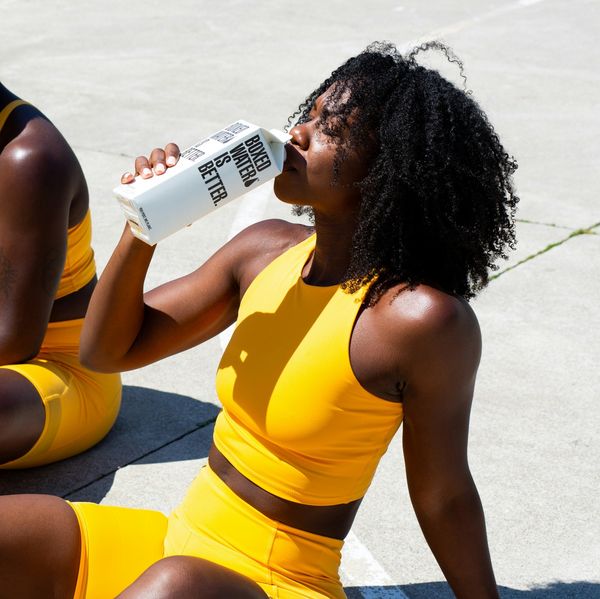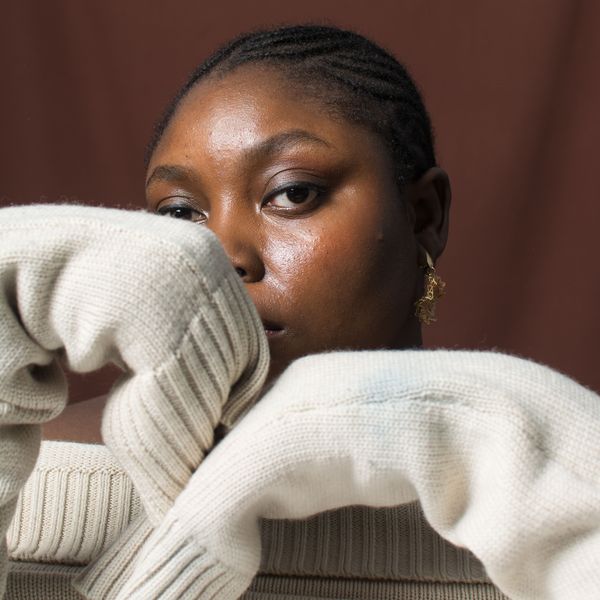
Decades before Black Girl Magic became a phrase and a way for Black women and girls across the world to conjure our inner alchemy, in 1997 ABC aired Cinderella the musical starring two of the biggest acts in music at the time: R&B princess Brandy Norwood and the late great Whitney Houston.
Tonight, in celebration of the musical’s 25th anniversary, ABC is airing a reunion special featuring cast members Brandy, Whoopi Goldberg, Paolo Montalban, Victor Garber, Bernadette Peters, Jason Alexander, and Veanne Cox. (Natalie Desselle, who starred as Cinderella's step-sister Minerva, passed away from cancer in 2020.)
We’re all familiar with the story of Cinderella: a girl who is orphaned after her father passes away and is left in the custody of her cruel and wicked evil stepmother and step sisters. The story has been given countless reimaginings and retellings, but according to the film’s producers the 1997’s Roger and Hammerstein's version came to life after Whitney had expressed interest in doing a musical.
“We’d had a call from Nicole David, Whitney’s longtime agent at WME, who’d said, "Whitney watched ‘Gypsy’ and she wants to do one. What ideas do you have?" For whatever reason, I pitched her "Cinderella,” executive producer Neil Meron said in an interview with Shondaland.
Once she got on board with the film, Whitney knew she wanted Brandy to play the titular princess. “Brandy was definitely handpicked by me,” she says in an old behind the scenes interview. “I definitely wanted her to be Cinderella.”
Despite tepid reviews at the time, Cinderella’s legacy continues to grow stronger over time. From the colorblind casting to the lavish costumes and the music that could only be brought to life by the voices of Whitney, Brandy, and the other talented performers like Broadway legend Bernadette Peters, Cinderella was an event unlike anything that had been seen on broadcast television.
I couldn’t have been more than ten years old when I first came across a VHS tape of the film at a flea market years after the film’s original release. I had already long been enamored by Brandy thanks to the many reruns of her hit sitcom Moesha that I would watch over and over again to the point of near exhaustion. I would similarly exhaust my copy of Cinderella, with my incessant rewatches, singing along to the iconic song Brandy and Whitney sang together "Impossible," as the Fairy Godmother magically transformed Cinderella's rags into a beautiful gown and mice into horses and a pumpkin into a carriage.
As time goes on, my appreciation for Cinderella grows. At the height of her fame when she had the opportunity to take any role she wanted, Whitney decided she wanted to gift Black girls everywhere the chance to see themselves as magical princesses.
There’s something particularly beautiful about allowing a young Black woman to assume the role of one of the most iconic figures in fairy tales; to assume the role of a character that is lured by a loving maternal figure out her life of misery and abuse, into a life of love and extravagance, allowing little Black girls to see that we could not only be royalty but that there could also be a beautiful life on the other side of trauma.
Twenty five years after Cinderella’s release, there’s a reason why we believe that truly nothing is impossible.
This Is How To Keep 'Holiday Season Stress' From Infecting Your Relationship
Hmph. Maybe it’s just me, but it seems like there is something really weird happening in the fall season air (because winter doesn’t officially begin until December 21) that cuddle season is in full swing while break-up season is as well. In fact, did you know that break-ups are so popular during the holiday season that December 11 is deemed Break-Up Day?
The reasons why relationships shift around this time vary; however, I did both roll my eyes and chuckle when I read that a very popular one is because it’s an easy way to get out of getting one’s significant other a Christmas present. SMDH.
Anyway, I personally think that the less shallow folks out here may contemplate calling things “quits” or they at least distance themselves a bit from their partner (and what I’m referring to is serious relationships) due to all of the stress and strain that oftentimes comes with the holidays whether it be financial, familial, due to their tight schedules or something else.
Listen, I would hate for you and your man to miss the fun and happiness of experiencing this time of year, all because you are so overwhelmed or irritated that you can’t really enjoy it. That’s why I have a few practical tips for how to avoid allowing the typical holiday season stress from INFECTING your relationship.
Manage Your Expectations
 Giphy
GiphyUnmanaged expectations. If there is a main reason why the holiday season tends to be so stress-filled for so many people, I’d bet good money that this is the cause. And when you’re in a long-term relationship, expectations can manifest themselves in all sorts of cryptic and/or unexpected ways. You might have relatives who assume that you are going to be with them for Thanksgiving or Christmas when you have other plans in mind. You might be thinking that you are going to spend one amount for presents while your man is thinking something totally different. When it comes to scheduling, your signals may be crossed.
And you know what? To all of these scenarios, this is where clear and consistent communication come in. Don’t assume anything. Don’t dictate anything either. From now until New Year’s, mutually decide to check in once a week, just to make sure that you are both on the same page as it relates to the holidays and what you both are thinking will come along with it. The less blindsided you both feel, the less stressed out you will be. Trust me on this.
Set (and Keep) a Budget
 Giphy
GiphyOkay, so I read that last year, 36 percent of Americans incurred some type of holiday-related debt. Hmph. Last year, there was still some sense of normalcy in this country, chile, so I can only imagine what finances are gonna look like over the next several weeks. That said, since I don’t know a lot of people who don’t find being broke stressful, make sure that you and your bae set a budget and then stick to it this year — no ifs, ands or buts.
Because really, y’all — it doesn’t make sense to deplete savings and/or max out credit cards for a few days of giggles only to be damn near losing your mind because you don’t know how to make ends meet come Dr. Martin Luther King, Jr. Day.
And by the way, this tip doesn’t just speak to things like food and gifts; I also mean travel. If it doesn’t make a ton of sense (or cents) to be all over the place this year — DON’T BE.
Keep Matthew 5:37 at the Forefront
 Giphy
GiphyIf off the top of your head, you don’t know what Matthew 5:37 says, no worries, here ya go: “But let your ‘Yes’ be ‘Yes,’ and your ‘No,’ ‘No.’ For whatever is more than these is from the evil one.” That verse right there? Oh, it’s a boundaries lifesaver! I say that because do you see “maybe” or “I’ll think about it” in there? Nope. LOL. It says that you should tell people “yes” or “no” and leave it at that — and that complements Anne Lamott’s quote, “’No’ is a complete sentence” impeccably well. Yeah, you’ve got to remember that anything beyond a yes or no to a request is privileged information; you don’t owe anyone details or an explanation.
Besides, if you are really honest with yourself, when someone asks you something and you give a “Umm, let me think about it” kind of reply, more times than not, you already know what your answer is going to be — so why not let you both off of the hook? Give your response. Commit to that. And let everyone (including yourself) get on with their lives and schedules.
I promise you that when it comes to those holiday parties, you are pissing more folks off by not RSVP’ing or doing so and not showing up than just saying, “Thank you but not this year” off the rip.
Remember That Your Personal Space Is Privilege Not a Right
 Giphy
GiphyA friend of mine recently bought a new house and invited me over to come see it. He’s a single man with no children, so as I was taking in all of the space that he had, especially as I walked through his finished basement, I joked about relatives coming to live with him. “Hell no” and “absolutely not” were pretty much his immediate responses as he went on to say that some folks even had the nerve to be offended when he told them that he had no intentions on taking DNA in.
Ain’t it wild how people think that your stuff is their right? And yes, that brings me to my next point. Your home is your sanctuary space. If you want to host folks this year — cool. If not, ALSO COOL. Please don’t let folks (family included) guilt you into how they want you to act or even into what they would do if the shoe was on the other foot. You are not them — and as one of my favorite quotes states, “If two people were exactly alike, one of them would be unnecessary.” (A man by the name Larry Dixon said that.)
Hell, my friends? They know that I am good for sending them random things that they need or even want all throughout the year. Coming over to hang out at my pace, though. Uh-uh. Chalk it up to being a card-carrying member of the ambivert club yet I like keeping my living space personal — and I sleep like a baby, each and every night, for feeling that way.
Always remember that your space, your time, your resources, your energy and shoot, yourself period (including your relationship), are all things that are your own. You get to choose how, when and why you want to share them. The holiday season is certainly no exception.
Cultivate Some “You Two Only” Traditions
 Giphy
GiphyIt’s not uncommon for some couples to hit me up after the holiday season to “detox.” Sometimes it’s due to the financial drama (and sometimes trauma) that they experienced. Sometimes it’s because they allowed their relatives (especially in-laws) to get more into their personal business than they should’ve. More than anything, though, it tends to be because they didn’t get enough quality time together and so ended up feeling “disconnected.”
Please don’t let that happen. Listen, I’m not even a holidays kind of woman and yet, I will absolutely sit myself down with some hot chocolate and chocolate chip cookies to enjoy a Hallmark holiday film or two. Aside from the fact that most of them are lighthearted and sweet, I also like that they usually focus on couples loving on each other amidst all of the holiday beauty and ambiance — which is something that all couples should set aside some time to do.
Maybe it’s a vacation. Maybe it’s a staycation. Or maybe it’s my personal favorite, A SEXCATION. Whether it’s for a few days, the weekend or even overnight — don’t you let the holidays go by without setting aside time for you and your man to celebrate one another. Don’t you dare (check out “Are You Ready To Have Some Very Merry 'Christmas Sex'?”).
GET. SOME. REST.
 Giphy
GiphyI once read that 8 out of 10 people get stressed out over the holidays and 3 out of 10 lose sleep during to it — and when you’re stress-filled and sleep-deprived, that can absolutely lead to hypersensitivity, making mountains out of molehills and even not being in the mood for sex.
Your relationship can’t afford to go through any of this, so definitely make sure to prioritize rest. I don’t care how unrealistic it might seem during this time, sleep should never be seen as a luxury; it will always and forever be a great necessity.
That said, try to get no less than six hours of shut-eye in (check out “6 Fascinating Ways Sex And Sleep Definitely Go Hand In Hand”) and even ask your bae to take a nap with you sometimes (check out “Wanna Have Some Next-Level Sex? Take A Nap, Sis.”). Not only will sleep help to restore your mind, body and spirit but, when it’s with your partner, it’s an act of intimacy that can make you both feel super connected, even in the midst of what might feel like chaos.
___
Holiday season stress is real. Still, never give it the permission or power to throw your relationship off. Put you and your man first and let the holidays be what they are gonna be, chile.
Let’s make things inbox official! Sign up for the xoNecole newsletter for love, wellness, career, and exclusive content delivered straight to your inbox.
Featured image by Shutterstock
Don Benjamin On New Projects, Family & How He And His Wife Healed After Public Split
Actor and model Don Benjamin continues to expand in his career while also being a present husband and father. We first learned of the model in 2013, competing on America's Next Top Model Cycle 20, and now he's starring in major films like the recent Jordan Peele movie HIM and Adopted 2.
He was even the leading man in Cardi B's latest music video "Safe," which also features Kehlani. In an exclusive xoNecole interview, Don opens up about his family and this phase in his life.
"Honestly, the funny thing is, it's just like any other phase," he admits. "I just focus on work and growth and leveling up. I'm super excited about this moment because now, I'm finally tapping more into my acting side of stuff." He also shows off his acting skills on social media. Don, along with his wife, Liane V, often shares cute family skits on their respective Instagram and TikTok pages.
The couple share two kids, 2-year-old daughter Zaia Sky and Zaiden, who they had in June 2025. According to Don, Zaia is already following in his footsteps. "She's already doing more modeling jobs than me as of lately, and we want to get her in some acting. She loves the camera," he says. "It'll be nice to see if she follows in my footsteps, and I can kind of help line some things up for her."
Don and Liane have been married for four years, but had a very public breakup the year before. The Scared Famous star reveals how they did the work to heal and move forward together.
"We had our time to separate and work on self-growth, things that I needed to do for myself as a man, and working with life coaches and therapists, and she got the time to do what she needed to do. So when we came back together, we were in the right space mentally. We got a relationship coach that we can go through things with and talk about and work on and these things were important for us. Now, over the years, I feel like that actually helped us come closer together. That moment helped us come closer together."
"We had our time to separate and work on self growth, things that I needed to do for myself as a man, and working with life coaches and therapists, and she got the time to do what she needed to do. So when we came back together, we were in the right space mentally."
He continues, "I did what I had to do to understand [that] as a man, I never really had any male guidance in my life. So it was able to align me with the right coaches and pastors and therapists and people that I needed to align with to work on things that I had been dealing with in life. Then she got the space that she needed as a woman to work on her independence.
"We came back together strong, and now we were able to get married in the right space. A lot of times, people jump into marriage when they're not fully healed or in the right headspace. So we were able to get married in that right space. For us, it's been a beautiful thing, and we're able to use that as as an example."
Don also believes it's important to set an example for their kids, especially when it comes to love and respect. While the actor grew up without his dad, he has made it his priority to instill love in his kids by showing up for them and giving them words of affirmations.
As far as what's next for Don, he is starring and executive producing a paranormal activity film titled, holySmoke. "I'm loving the drama and horror space right now," he says.
"I always love a good romantic comedy, but right now. I seem to be getting reeled into all these horror films and thrillers and dramas."
Let’s make things inbox official! Sign up for the xoNecole newsletter for love, wellness, career, and exclusive content delivered straight to your inbox.
Feature image Nikita Melvil









